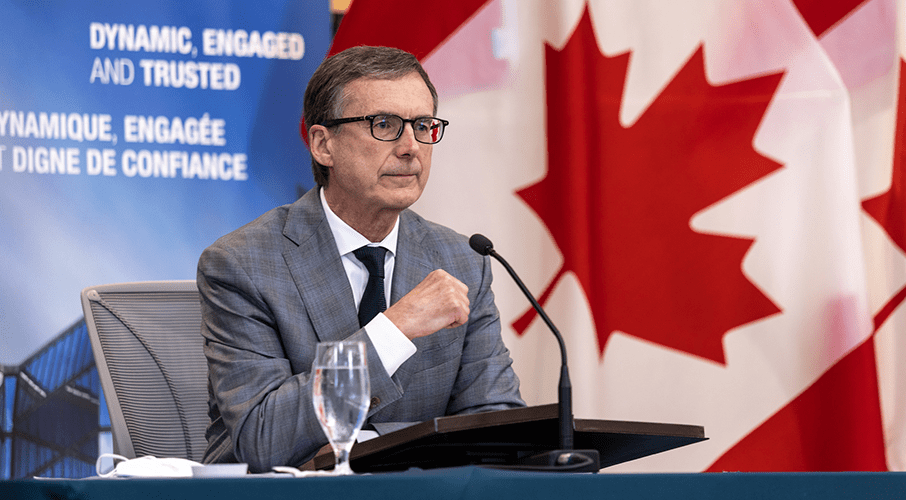 This article originally appeared in the Hamilton Spectator.
This article originally appeared in the Hamilton Spectator.
By Jerome Gessaroli, July 13, 2022
The Bank of Canada, expected to further raise interest rates this week as it seeks to calm an overheated economy, has a big challenge: Canada’s strong economic recovery from the pandemic has come with inflation the country hasn’t experienced in 40 years.
Early in the pandemic, the central bank correctly put programs into place ensuring credit market liquidity. It also reduced its policy interest rate to 0.25 per cent and began quantitative easing, which further lowered borrowing costs and set the stage for the federal government’s massive stimulus program.
What is difficult to explain, however, is its handling of inflation after the economy reopened. The bank’s stated target is to maintain Canadian inflation around one to three per cent, allowing for some short-term flexibility. However, it has underestimated inflation ever since the economy reopened. It currently sits around 7.7 per cent.
Bank of Canada Deputy Gov. Paul Beaudry recently acknowledged the economy’s quick rebound from the pandemic shutdown, citing reasons such as “exceptional fiscal and monetary policy stimulus.” What he didn’t acknowledge was that the same fiscal and monetary stimulus is feeding inflation.
The bank should know their explanation was incomplete. Policies implemented by the bank and the federal government during the pandemic were highly inflationary. In 2020, the bank bought $380 billion in government securities, lowering interest rates across the yield curve and injecting mass liquidity into the economy. Moreover, since 2020, the top three federal COVID-related benefit programs provided $193 billion to individuals. While some of those programs were useful, much of the money was not actually spent. Since many businesses had shuttered or reduced their output during this time, billions of dollars ended up in savings or paying down household debt.
Increased savings and the availability of cheap credit became big spending reservoirs which households began using when the economy reopened. It is now apparent that low interest rates, the expanded money supply, and massive federal spending all combined to create demand-side inflationary pressures.
To be sure, supply chain constraints and energy prices are factors, as demonstrated by China’s recent COVID-19 lockdown policies. However, if supply chains drove inflation, we would see relative price increases — on items caught up in supply chain problems. But price increases are more broad-based, indicating that much of our inflation is being driven by too much demand.
While there is a strong case for interest rates even higher than those being considered, the Bank of Canada wields a blunt instrument in its policy interest rate — the cost of borrowing from the central bank itself. Raising rates can reduce inflation, but risk fuelling a recession. The bank wants to avoid rate hikes that would lower inflation but raise unemployment and undo what Ottawa has spent billions trying to achieve during the pandemic. This would also add billions of dollars to debt charges, significantly impacting government spending capacities and deficit targets. The bank knows that Canadian households — the most highly indebted of all G7 countries — could be hurt disproportionately by aggressive rate hikes.
The bank’s plan was to stay with modest interest rates but be forcefully clear to Canadians that it would move more aggressively on higher rates if that was necessary to lower inflation. By trying to manage inflation expectations through an aggressive communications strategy rather than large rate hikes, the bank sought to engineer a soft economic landing.
This well-intentioned strategy has failed. Surveys of households and businesses are showing that most Canadians expect inflation and wage growth to remain elevated.
The Bank of Canada is in a difficult position. Failing to acknowledge the inflationary effects of its monetary policy, coupled with the government’s fiscal stimulus, may have initially led to timid rate hikes, but now it is playing catch-up. It now has little choice but to hike rates more aggressively, resulting in a much higher chance of a recession.
Jerome Gessaroli teaches at the British Columbia Institute of Technology and is a visiting fellow at the Macdonald-Laurier Institute.





